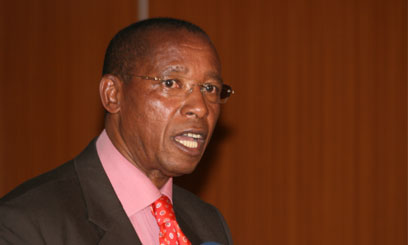
Justice and Legal Affairs Committee tabled a report in the House asking MPs to reject Mumo Matemu's nomination/FILE
Kilonzo told journalists on Wednesday that the ruling directing the Leader of Government Business to move the Motion for the approval of the nominees of the anti graft commission, was misplaced.
He argues that the mandate to move the Motion lies with the Legal Affairs Committee and the latest decision creates confusion and further delays the process of setting up the country’s anti graft body.
“This is a matter for the Legal Affairs Committee; it is not a matter for the Leader of Government Business because if their Motion was negated it means their work has not been exhausted,” he argued.
“The resolution of the House did not return those names to the Leader of Government Business because he is nominated by the Executive,” observed Kilonzo.
Last year, the Justice and Legal Affairs Committee tabled a report in the House asking MPs to reject Mumo Matemu’s nomination as the EACC Chair, alongside Jane Onsongo and Irene Keino on grounds that “they lacked passion” to lead the war on graft.
But in a sharply contested vote, the MPs voted against the committee’s request, and appeared to endorse the three candidates.
But Marende then issued a ruling indicating that the votes cast only bore impact on the committee’s report and had no bearing on the fate of the nominees.
During the vote, MPs tied at 49-49 but Deputy Speaker Farah Maalim cast a vote, tilting the ballot against the committee’s recommendations. A dispute then arose on the validity of Maalim’s vote with lawmakers arguing he could not cast a ballot from the Speaker’s chair.
The Standing Orders however give the Speaker, a deputy or temporary speaker the mandate to cast a vote during a division.
“It is important that the government moves expeditiously to move a Motion for the approval of the nominees of the anti corruption commission so as to enable the House to make its decision such that the Executive may be appropriately advised by the Speaker,” he said at the time.
The Justice Minister also advised the Principals against withdrawing the three nominees from Parliament saying that it was not the solution.
He maintained that the only way forward was through a fresh Motion by the Legal Affairs team which would see the House reject or adopt their nomination.
“To withdraw at this point is completely unacceptable to me because it suggests that the President and Prime Minister are not sure of the sort of leadership they ought to offer such an important institution,” he said.
“I don’t think that they should succumb to the numbers in Parliament because the war against corruption is not about numbers,” he argued.
He added that he had also written to the Kenya Law Reform Commission seeking to amend the EACC Act, which was watered down by Parliament last year as MPs sought to beat the August 27 deadline.
Kilonzo revealed that some of the amendments sought would give the EACC prosecutorial powers, which had been taken away by the MPs.
“We have to give the anti corruption commission the power to prosecute just like we have done with the electoral commission, which will oversee the elections as well as investigate the violation of the electoral laws,” he said.
He also assured Kenyans of safeguards that would ensure that the EACC does not become rogue and abuse its powers.
“One safeguard is to make sure that the EACC does not directly go to court until the Director of Public Prosecutions delays or fails to prosecute a particular case. So this is one way of creating a regulated commission; not a monster,” he said.










































